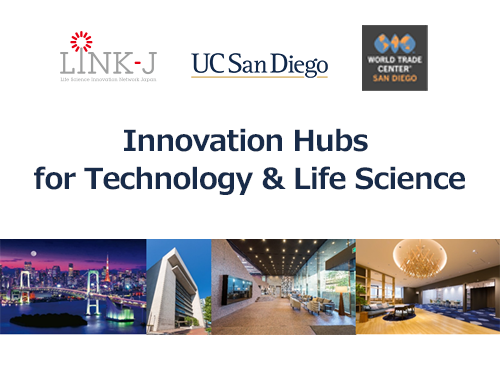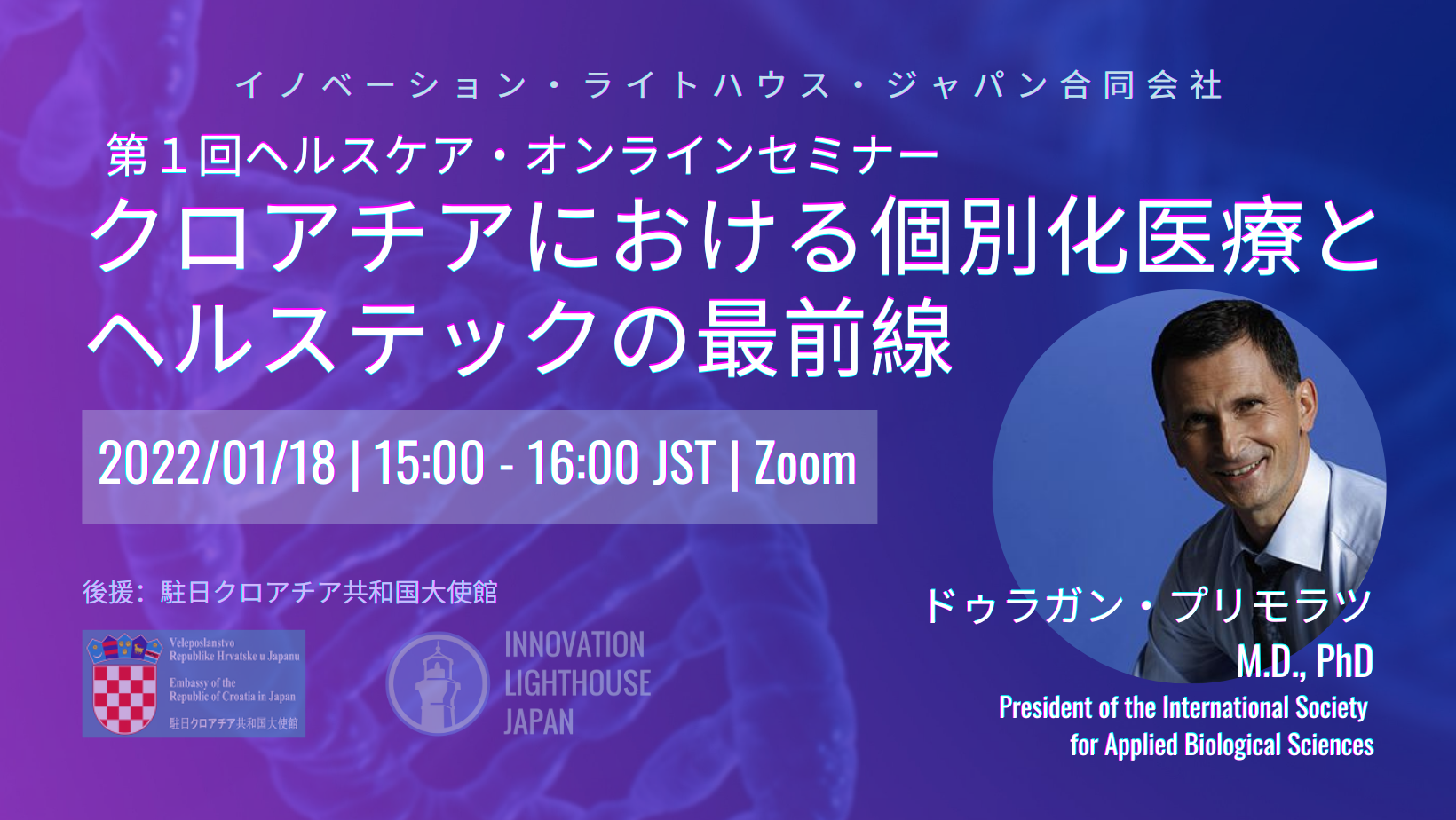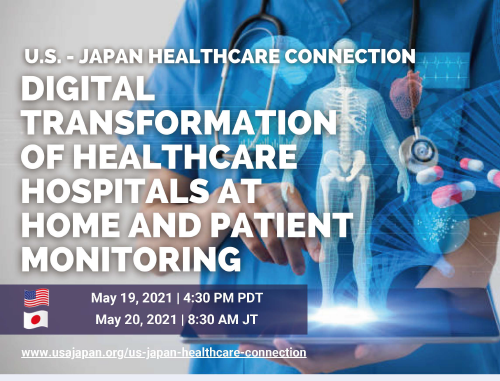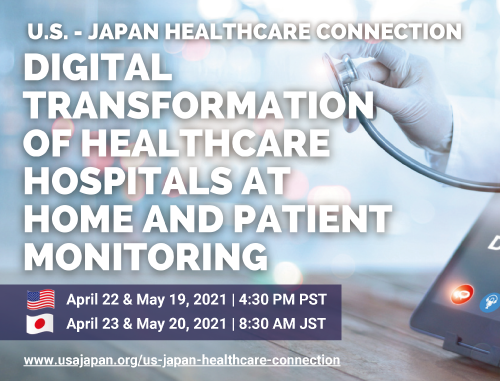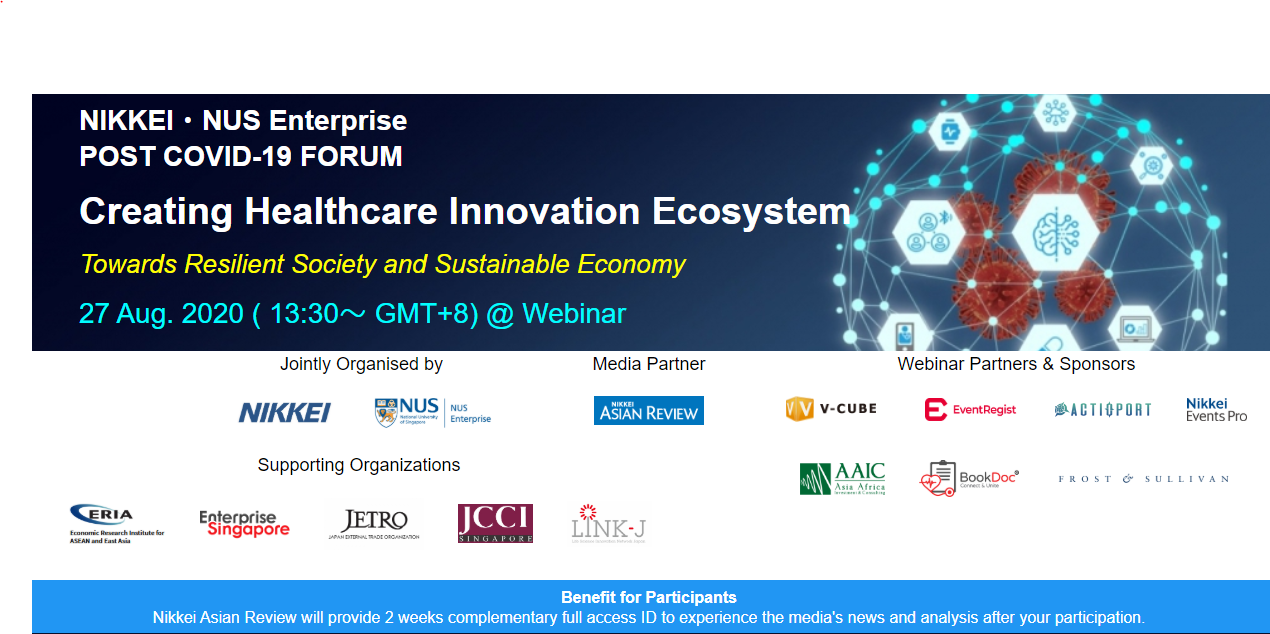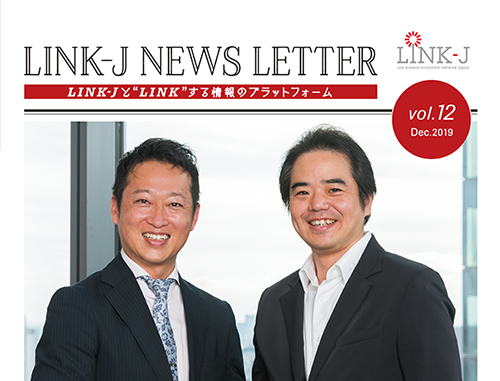
Digital data is generated where medical treatment is provided, such as that from health insurance claims, digital medical records, DPC, and medication dispensing data. Conducting a data analysis of this large amount of medical information is expected to be beneficial in a variety of areas including researching new treatment methods, lengthening of healthy life expectancy, improving the quality of medical service, and reducing medical costs. The current state in Japan, however, the utilization of medical information is not making good progress. To search for clues on how to resolve the related problems and issues, we held an online symposium with Professor Nakai of The Institute of Medical Science, The University of Tokyo, Mr. Shimo of the medical information service company BLUEBOOKS, and Mr. Izumi and Mr. Nishida of the Boston Consulting Group (BCG).
Increasing use of medical and genome information
Nishida My name is Nishida. I'm a LINK-J supporter and I'll be the facilitator for today. Today I would like to discuss with you the "Issues and prospects regarding the utilization of medical information." I'm in charge of the healthcare field at BCG, and no matter what topic is being discussed, it always touches on utilizing medical information and data. First of all, I would like to have each of you share how you are involved with medical information.
Izumi I belong to GAMMA, BCG's special organization for data science, and I specialize in the AI and digital fields. At BCG, the consultants in charge of specific industries cooperate closely with those of us in the digital division, and we collaborate with Mr. Nishida to create new value utilizing real world data (RWD). For today's symposium we have invited Dr. Nakai and President Shimo, whom we met through the Japan Association for Medical Artificial Intelligence.
Nakai I graduated from the faculty of Science, and since 2003, I have been involved in human genome analysis and developing methodology for it as a professor at the Human Genome Center of the Institute of Medical Science, the University of Tokyo. My specialty is computer analysis, and though I'm not directly involved with medical information, I've been impressed by Okinawa Prefecture's Kume Island Digital Health Project, which combines medical information and genome analysis to search for the causes of lifestyle diseases, so I'm sharing my experience and knowledge with President Shimo, who is participating in the project.
Shimo I'm Shimo, president of BLUEBOOKS Co., Ltd. Our company provides health and medical information gathering and utilizatingservice to improve the efficiency and quality of medical treatment to contribute to better health for patients. The Kume Island Digital Health Project just introduced by Dr. Nakai is a demonstration project for mitigating and preventing lifestyle diseases utilizing medical data. Analyzing the data of island residents showed there are many people with undesirable kidney function values from childhood, leading to the hypothesis. There might be a genetic cause for this, so genome research is being conducted to investigate this.

Nishida OK, so let's begin the discussion with the understanding that everyone is involved with medical information and genome information from a different perspective. For of all, what is the history behind the development of genome and medical information and the current state of data utilization?
Nakai Since the conclusion of the Human Genome Project in 2003, a large amount of genome information is accumulated thanks to the development of next-generation sequencers and major reductions in cost. Recently, the combination of additional epigenome information and other data, such as proteome and metabolome data, with genome information has led to the blossoming of multi-omics research for the comprehensive understanding of life information.
Shimo The background of medical information gathering in the case of our company began in 2011 when we were developing business in Okinawa. Since Okinawa is surrounded by ocean, there are limited opportunities to receive medical examinations from medical institutions outside the prefecture, and since a high rate of residents remain in the prefecture, the conditions are good for continuously accumulating data with high density. Further more, while the prefecture has been known for the longevity of its residents, the local government and medical association have become concerned about the recently decreasing longevity in Okinawa due to lifestyle diseases and thus are supportive of utilizing medical information.
Based on this, we built a system that connects the systems of medical institutions and the local government to automatically capture the generated medical information. Currently, the system has accumulated one million unique IDs consisting of the patient's name, date of birth, address, and gender and stores five million cases of medical data and 5.7 million pieces of image data going back 20 years. Some genome data has also been collected.
Utilization of this data is divided into the three categories of "Sharing of patient data between hospitals," "Patients viewing and recording their own medical and health data," and "Academic and company research use." Looking at the sales breakdown shows that most sales are for research use because the data is prized for being able to track the medical history of individuals going back 20 years.
Achieving optimum medical treatment for individuals by combining information
Nishida How will progress in utilizing medical and genome information gives impact to medical treatment and healthcare?
Nakai Combining genome information with RWD as BLUEBOOK is doing makes it possible to conduct Genome-Wide Association Studies (GWAS) to statistically investigate the relationships between genome characteristics and illness. Illnesses are rarely caused by a single gene, with most illnesses being multifactorial diseases caused by a complex interaction of multiple genes and environmental factors. For this reason, there is much hope that GWAS together with the cooperation of large numbers of volunteers will lead to large-scale cohort studies, both in Japan and overseas, that will be useful in identifying illness onset mechanisms and developing methods for their treatment and prevention. Based on this research, treatments using individual genome information are being developed to provide so-called individualized medical treatment or precision medical treatment. An example of this is the molecular targeted drugs for cancer treatment that are only effective on patients for which a specific receptor has mutated.
Individualized or precision medical treatment are for treatment post onset, but "preemptive treatment" where appropriate treatment interventions are taken in advance of illness onset by predicting future onset based on genetic predisposition and daily health information are being developed.

Nishida If we can use data analysis to predict illness pre-onset and then prevent the illness using appropriate interventions, the impact from a business perspective will be quite large. In this regard, it is America that is producing results using medical information. In America, the individual medical expense burden is quite large, so insurers are using data analysis of member data to segment the common factors of people with serious illnesses that are expensive to treat, such as heart failure, to analyze when it is effective to intervene to prevent serious illness and reduce the cost of medical treatment by billions of dollars.
Shimo This is a different angle, but I think that if the use of RWS by companies advances, I think we will see a change in individual behavior. Currently, no matter how much health insurance associations promote healthful behavior, it is very difficult to get people to adopt a new behavior or cease an old one, even for 5 minutes a day. If, however, when shopping at the supermarket and thinking about what to eat for dinner, information useful for managing your health is provided, such as displaying recommendations like, "How about eating this?," then there is a high possibility those recommendations will be followed. Consumer behavior equals health behavior. I think it is important or food companies and cosmetics companies to use medical information.
What is the reason that Japan has a hard time making progress with use of medical information?
Nishida From what everyone has said, we can see the prospects will open up if the use of medical information advances. In Japan, however, we face the issue where the use of data is making little progress. What is obstructing this?
Izumi From the perspective of a party that handles data, one issue is the difficulty in using that data because it is scattered among individual medical institutions, health insurance associations, and the local governments that handle the national health insurance.
Shimo The Naha City Medical Association is cooperating with our company because they want to give something back to the residents of the city and prefecture by effectively utilizing the medical data they have acquired, but this response is the exception, since there is a high percentage of medical institutions and associations that are hesitant to pass medical information to another party. It initially took us three years to gain the necessary cooperation for this and we have increased our credibility by not suffering any information leaks for 10 years.
Izumi Even when we want to utilize the data, there are cases where data suitable for the purpose is not available or when providing information to a third party organization is deemed to be outside the intended purpose of use. It is important to first consider data use themes that are beneficial to society, build the business scheme, and then create a platform for accumulating RWD that is suitable for the objective. Also, since there are gray areas in the system regarding what kinds of approvals must be obtained to allow secondary use, the system needs to be revised to clarify this.

Shimo That is correct. The need by companies to use medical information is high, but currently the approval of the subjects can only be obtained for academic research and there is no scheme for providing data directly to companies. I think more flexible use will be possible if support from government can be obtained, such as by modifying the system and relaxing the regulations.
Nishida The reason insurers are taking the lead in using RWD in America is because there is the strong incentive of being able to convert insurance premiums to profits if the insured are healthy. And, of course, it is a win-win for both parties if the insured are healthy. In Japan, however, where under the national health insurance the burden of the cost of medical treatment is low for patients, this incentive just doesn't seem to take effect even though medical costs are pressuring the country's finances. I think this situation would change if there was more realization in Japan of the financial significance of using RWD.
Izumi Another issue is the extreme lack of people handling medical data. While Dr. Nakai and many other researchers in academia are producing good research results using genome information, there are very few people using medical information in and around the medical industry. The medical industry has focused on special analytical methods using medical statistics and other means, but other new technologies, such as AI and big data, continue to arise, so if these are not used to create value, then Japan cannot win the competition with other countries.
Nishida What are the specific skills possessed by people who handle medical data?
Izumi They are required to have knowledge of medicine or pharmacology, medical systems, ethics, and data science; experience processing data as software engineers; and the business skills necessary to turn these into value creation and implementation. But since each of these fields is quite intensive, there is likely no one possessing all of these skills. So in reality, we form multi-industry collaboration teams of people who can understand other areas in addition to their own specialty.
Creating an environment for freely using data and improving data accuracy are the keys
Nishida Please share your thinking of how to solve the issues that have been raised and what you would like to see achieved going forward.
Shimo From the viewpoint of platform creation, our company is developing the foundation for the anonymous processing of personal information using statistics. Having researchers define their research theme and outputting only the calculation results using anonymity processing that prevents the identification of individuals, has been interpreted by the law as not being deemed to be the provision of personal information. We are also planning data library formation that will allow researchers to specify the data they want to use.
Izumi I'm involved in the training of data scientists, so I want to train people who can utilize medical information by thinking of value creation themes themselves and then match these with the latest technologies. When I questioned the students of incubation facilities that produce many AI people, the majority of them said they want to incorporate AI into the healthcare sector. Healthcare is an area where value can be returned to society and individuals. However, the field and data necessary for them to work are not available. Therefore, creating this field must be done concurrently with training the people.
Nishida I think the human resource and other infrastructure are important, but I wonder if it is also possible to strengthen the collaboration with the business side by utilizing people from academia where data analysis is progressing?
Nakai It is important to be able to freely ideate data and to conduct analysis from a fresh viewpoint. For example, if students with backgrounds completely different from medicine are able to freely analyze medical data, this will probably give birth to creative research. Such new ideas could be jointly researched by academia and business. The information ethics for the handling of medical information is very strict, however, so sufficient care must be taken in this regard.
Izumi As Dr. Nakai said, we must create an environment where data can be used for free thinking in order to apply RWD to business. At the same time, data accuracy also needs to be improved. I think possibilities for an environment where data can be freely used include a form where NDB (an information database of Health Insurance Claims, Specific Health Checkups and Specific Health Guidance Data) leads to development of onsite research centers and such things as the anonymous processing and data generation undertaken by President Shimo. For accuracy as well, a data environment that ensures the ethical and secure use of data must be created. Further, it must be incorporated into familiar products and services to make citizens enjoy the benefits of RWD.
Shimo I think including the perspective of improving personal convenience is indispensable for promoting data utilization. For example, if our company's data is used, a flea market app can be used to easily sell products anonymously, which expands the utilization possibilities beyond the fields of medicine and healthcare. I would like for many people to understand such possibilities for a variety of usage methods and leading to behavioral changes.
Nakai The United States and Europe lead in medical information analysis, but this doesn't mean the European and American research results can be applied as is to Japanese, so Japan needs to conduct its own research. My hope is that people will recognize the success stories of businesses like BLUEBOOK and that this will add momentum to the utilization of medical information.
Izumi LINK-J has recently opened the Life Sciences Hub West in Doshomachi, Osaka. I expected that this facility will become the place which create collective knowledge through the human, corporate, and industry/academic/government networks of both the East and West facilities to solve the issues brought up in today's symposium.
Nishida I talked about economical medical treatment, and I realized once again the importance of collaboration among many players to both acquire the capability and effect the behavioral changes necessary to achieve this. Thank you very much for today's very informative discussion.
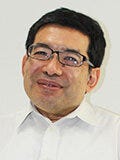 Kenta Nakai Professor of Functional Analysis in Silicon at the Human Genome Research Center, The Institute of Medical Science, The University of Tokyo
Kenta Nakai Professor of Functional Analysis in Silicon at the Human Genome Research Center, The Institute of Medical Science, The University of TokyoGraduated from the Faculty of Science, Kyoto University. Acquired a doctorate from Kyoto University. Assumed his current position in 2003 after serving as an assistance at the Kyoto University for Chemical Research, assistant at the National Institute for Basic Biology at the Okasaki National Joint Research Facility, and assistant professor at the Osaka University Cell Bioengineering Center. Conducts research on bioinformatics using computers to analyze genome information and gene product function. Also conducts joint research with leading-edge researchers in such fields as regenerative medicine, immunology, and developmental biology.
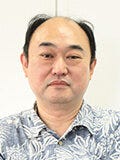 Hideyuki Shimo President & CEO of BLUEBOOK Co., Ltd.
Hideyuki Shimo President & CEO of BLUEBOOK Co., Ltd.Graduated from the Department of Sociology, Faculty of Letters, Komazawa University. Established BLUEBOOK Co., Ltd., in March 2002, after holding positions with Yano Research Institute Ltd. (In charge of health and sports), Sekisui Chemical Co., Ltd. (In charge of home health for applied sensor technology), and Saison Group, etc. In cooperation with the local governments and medical associations in Okinawa Prefecture, his company has built a medical database of over 1 million people as well as developing services that produce health and medical information process for anonymity that is used by research organizations and academia.
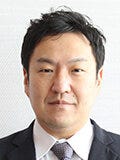 Akira Izumi Associate Director of GAMMA at the Boston Consulting Group.
Akira Izumi Associate Director of GAMMA at the Boston Consulting Group.Received a Master of Business Administration (MBA) from the University of Tsukuba. Joined BCG in 2019 after working at IBM, Recruit, and Deloitte Touche Tohmatsu. Supports corporate transformation utilizing AI, data science, and digital technologies. He is also involved in formulating standard rules for the medical data industry and creating new business schemes that involve local government, universities, hospitals, and private companies. He is also involved in the acquisition and training of data and digital human resources and as an associate professor he lectures for the Medical Data Scientist Course he established in the Graduate School of Kyoto University.
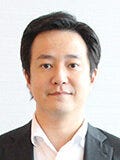 Shogo Nishida LINK-J supporter, Managing Director & Partner of the Boston Consulting Group.
Shogo Nishida LINK-J supporter, Managing Director & Partner of the Boston Consulting Group.Joined BCG in 2005 after graduating from School of Engineering, Tokyo Institute of Technology and then working for Nissan Motor Corporation. Serves as a core member of the Healthcare Group and the Organization and Human Research Group. He provides support for global strategy formation and execution, reorganization, system integration, digital transformation, improving research and development productivity, production and operation reformation, sales and marketing strategy, and creating new businesses utilizing digital technology for mainly pharmaceutical companies and medical equipment manufacturers.
